Online poker tournaments offer a wide range of formats for players, from deep stack and sit & go events to fast-paced turbo and bounty tournaments. Understanding the nuances and the poker strategy for each type is crucial to improving your chances of success.
In this guide, you’ll discover expert strategies tailored to each tournament format, helping you develop the skills needed to compete at your best, whether you’re chasing a WSOP satellite seat or dominating heads-up matches.
Learn when to play tight, when to push aggressively, and how to adjust based on your opponents and the structure of the game.
Key Takeaways
- Adjust Your Strategy for Each Format: Different tournaments like MTTs, Rebuys, and Satellites require tailored approaches to maximise your success.
- Understand When to Be Aggressive: Knowing when to push aggressively, especially during critical phases like the bubble, can make or break your run.
- Position and Timing Are Crucial: Use position to your advantage, especially in middle and late stages, to steal blinds and control the pace of play.
- Focus on Survival in Satellites: In satellite tournaments, prioritise preserving your stack over risky plays to secure a seat in bigger events.
Multi-Table Tournaments (MTTs) with Guaranteed Prize Pools
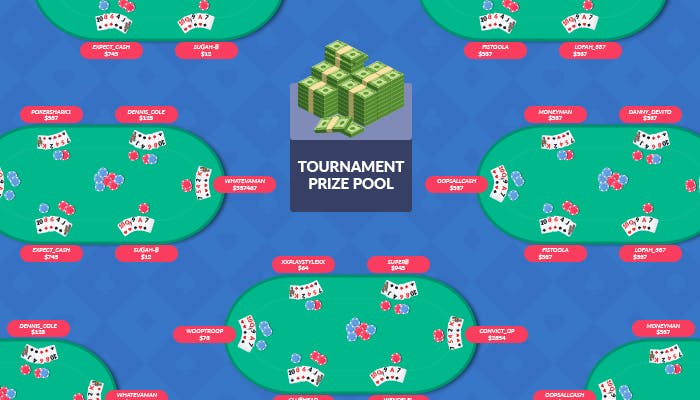
Multi-Table Tournaments (MTTs) with guaranteed prize pools are a favourite among players. These tournaments feature large fields across multiple tables and promise a set prize, regardless of the number of entries. This allows players the opportunity to win substantial payouts for relatively low buy-ins, making GTD MTTs a favourite choice for many players.
- Pace: Starts slow but intensifies as players are eliminated.
- Ease: Great for patient players who excel at tournament discipline.
Recommended Strategy
Adjust to the Stage of the Tournament
The key is pot control. With large stacks compared to the blinds, aim to see more flops without committing too many chips. Play speculative hands like suited connectors or small pairs to try and build a big stack early, but avoid overcommitting on marginal hands. This phase is more about gathering information and staying disciplined. Avoid big risks unless you have strong hands.
Stealing Blinds in the Middle Stages
When the antes kick in and stacks start shrinking, blind stealing becomes crucial. Focus on your position—the closer to the button, the better for raising. Target players in the small and big blinds who are either passive or on shorter stacks. Be wary of opponents with 10–15 big blinds, as they may try to resteal from you.
Bubble Play Strategy
The bubble is one of the most important phases of the tournament. If you’re a big stack, you should increase aggression, especially against players who are just trying to make it into the money. Smaller stacks tend to tighten up to avoid elimination, giving you room to steal poker blinds and antes. Conversely, if you’re short-stacked, focus on survival and only play premium hands.
Post-Bubble Strategy
Once the bubble bursts and players have secured a payout, the play tends to loosen up. The short stacks will often shove, and big stacks may try to knock them out quickly. If you’re sitting on a mid-stack, avoid big confrontations and focus on steadily accumulating chips.
Bet Sizing and C-Betting
In MTTs, preflop raises have shifted towards smaller sizing, such as 2–2.2x the big blind. This allows you to manage your stack and apply pressure without risking too many chips. For continuation bets (c-bets), use smaller sizing early on (around 33% of the pot) to see if your opponent folds, especially if you’re unsure of their hand.
Defending the Big Blind
In modern tournaments, defending your big blind is critical, especially against late-position raises. You only need about 20% equity to justify a call, so defend with a wider range of hands—particularly suited connectors or low pairs.
Rebuy Online Poker Tournaments
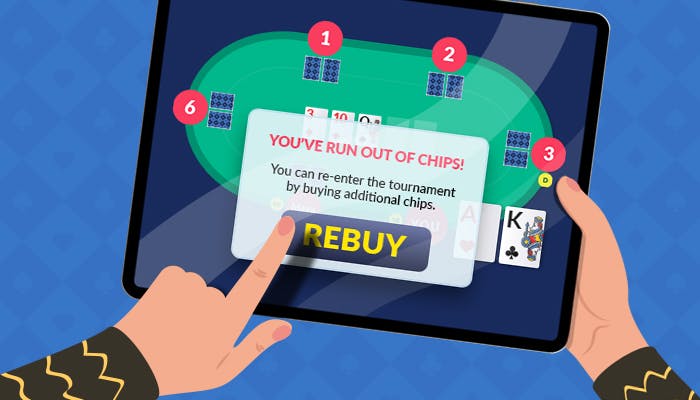
Rebuy tournaments allow players to purchase additional chips if they lose their initial stack within a set time period, usually ranging from 1 to 4 hours. This structure encourages more aggressive play early on since players know they can rebuy if they bust out, leading to a dynamic and fast-paced environment. After the rebuy period ends, the tournament resembles a freezeout, becoming much more strategic as no more rebuys are allowed.
- Pace: Fast and loose during the rebuy phase, as players take bigger risks to build large stacks. After the rebuy period ends, play slows down significantly, with participants becoming more calculated.
- Ease: The rebuy period is forgiving, allowing players to recover from early mistakes, but the post-rebuy phase is much more challenging due to fewer second chances.
Recommended Strategy
Rebuy Period: Aggression Pays Off
The rebuy period is the time to be aggressive. Your primary goal is to build a large stack that gives you a comfortable lead when the tournament transitions into the post-rebuy phase. Since players are more likely to gamble with weaker hands, you can loosen your starting hand ranges and take more calculated risks.
- Play More Hands: Speculative hands like suited connectors or low pairs become valuable since you can rebuy if things go south.
- All-In Situations: Don’t be afraid to push all-in with strong draws or made hands. Many opponents will be playing loosely, so capitalising on this can help you chip up significantly.
- Rebuy Wisely: If you bust, rebuy immediately. Staying competitive and not falling too far behind in chips is crucial.
Add-On Consideration
Most rebuy tournaments offer an “add-on” option at the end of the rebuy period. If you’re not one of the chip leaders, taking the add-on is usually advisable to ensure you’re well-equipped for the next stage.
Post-Rebuy Period: Tighten Up
Once the rebuy phase ends, the tournament transitions into a more traditional freezeout format. The ability to rebuy is gone, so players become much more cautious and conservative with their remaining chips.
- Tighten Your Hand Range: Shift to a tighter, value-based strategy. Only play hands that are likely to hold up in big pots.
- Steal Blinds Judiciously: Focus on positioning and avoid situations where you’re likely to face a resteal from medium stacks.
- Post-Flop Play: Since players will be playing tighter ranges, focus on making accurate post-flop reads, especially on dry boards.
Bubble Play: Pick Your Spots
The bubble stage can be volatile in rebuy tournaments. If you’re a big stack, use this phase to push short stacks and steal blinds. If you’re short-stacked, avoid unnecessary confrontations and wait for premium hands.
Freezeout Poker Tournaments
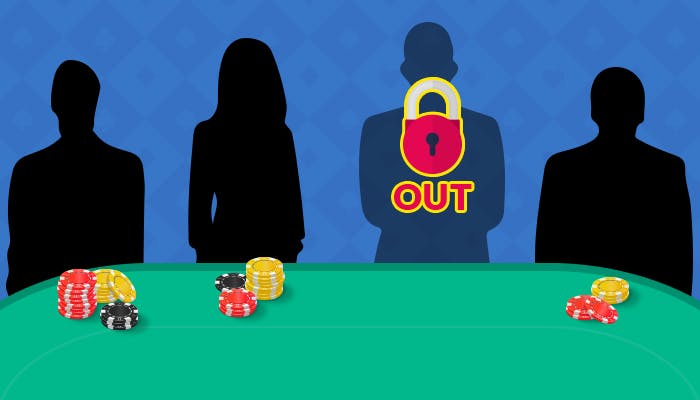
Freezeout tournaments follow a simple yet challenging structure: once you lose all your chips, you’re out of the tournament. With no option to rebuy or add-on, every hand becomes crucial. This structure places a premium on patience, discipline, and strategic decision-making.
- Pace: The tournament starts moderately but intensifies as players are eliminated and blinds increase.
- Ease: Ideal for players who enjoy a skill-driven format, where chip preservation and thoughtful aggression are rewarded over reckless play.
Recommended Strategy
Early Stages: Focus on Preservation and Information Gathering
- Play Tight, Conserve Chips: Stick to a tight range of hands and avoid speculative hands unless position and pot odds justify it.
- Gather Information: Use early levels to observe opponents’ tendencies for later exploitation.
Middle Stages: Adjust Your Aggression
- Expand your hand range in late position to steal blinds and pressure shorter stacks.
- Position becomes crucial for controlling action and isolating weaker players.
Bubble Play: Leverage Stack Size
- If You Have a Big Stack: Pressure smaller stacks and steal blinds aggressively.
- If You Have a Small Stack: Play tight and focus on survival until the bubble bursts.
Post-Bubble Strategy
- Increase Aggression: Target weaker players who loosen up after the bubble.
- Target Weak Players: Accumulate chips through well-timed aggression.
Final Stages: Survival and Strategic Aggression
- Short Stack: Adopt a push-fold strategy when short.
- Big Stack: Apply maximum pressure to control the action and force mistakes.
Bounty (Knockout) Poker Tournaments

Bounty or Knockout tournaments offer an exciting twist on traditional poker tournaments by rewarding players with a cash bounty for every opponent they eliminate. A portion of each player’s buy-in is set aside as a bounty, which is awarded to the player who successfully eliminates them.
- Pace: Typically more aggressive than regular MTTs due to the incentive to knock out opponents.
- Ease: Suited to players who enjoy fast-paced, action-heavy formats.
Recommended Strategy
Early Stages
Resist reckless bounty hunting. Focus on solid hands and survival; early bounties are often not worth risking your stack.
Middle Stages
- Target short-stacked or vulnerable opponents and isolate them when possible.
- Use positional aggression to capitalise on bounty opportunities.
- Avoid multi-way pots when trying to claim a bounty.
Late Stages
Balance bounty hunting with survival and consider ICM when nearing the final table. Short stacks are prime targets, but don’t sacrifice your tournament life for bounties unless the risk is justified.
Maximising Bounty Opportunities
Consider pot odds and bounty value when deciding whether to take risks. When the combined bounty and pot offer good ROI, calculated risks can be worthwhile—always weigh these against stack preservation and ICM factors.
Deep Stack Poker Tournaments

Deep Stack Poker Tournaments give players a larger starting chip stack compared to traditional tournaments, allowing for more strategic play over a longer period. Deeper stacks emphasise skillful post-flop play and strategic decision-making.
- Pace: Slow, offering opportunities for strategic play throughout the tournament.
- Ease: Ideal for methodical players who prefer thoughtful, post-flop play.
Recommended Strategy
Early Stages
- Widen your hand range to include speculative hands with high implied odds.
- Focus on post-flop skills and positional play to outmaneuver opponents.
Middle Stages
- Start accumulating chips more aggressively while monitoring opponent stack sizes.
- Leverage position to apply pressure on hesitant players.
Late Stages
Transition toward survival mode when blinds catch up to stacks—be selectively aggressive and adapt to changing stack dynamics.
Sit & Go Poker Tournaments (SnGs)
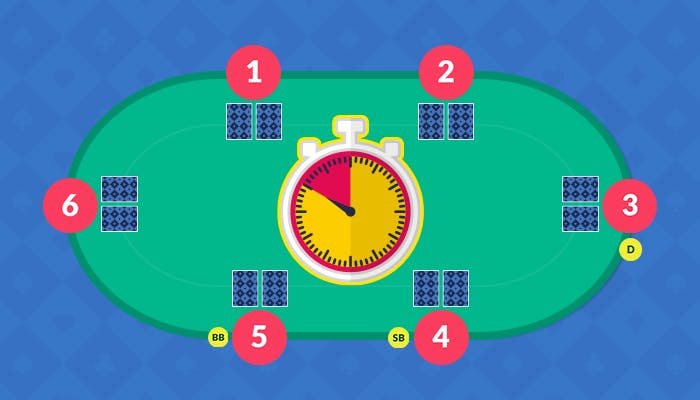
Sit & Go (SnG) tournaments are small, fast events that start once a set number of players register (typically 6–9). They are popular for players seeking quick action without the time commitment of larger MTTs.
- Pace: Fast-paced with rapidly increasing blinds.
- Ease: Easy to join, but requires adaptability as blinds escalate.
Recommended Strategy
Early Stages
Play tight and conservatively; preserve your stack and focus on premium hands.
Middle Stages
Loosen up to target passive players and steal blinds from late position.
Late Stages
Shift to a push-fold strategy when stacks shrink below ~10–15 big blinds and consider ICM near the payouts.
Turbo & Hyper-Turbo Sit & Go Poker Tournaments (SnGs)
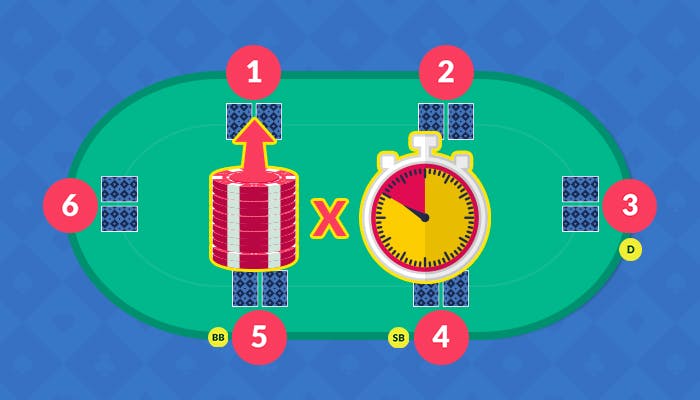
Turbo and Hyper-Turbo SnGs are high-speed formats where blind levels increase rapidly (Turbo: ~3–5 minutes; Hyper-Turbo: ~1–3 minutes). These force early short-stack play and emphasise push-fold strategy.
- Pace: Extremely fast with escalating blinds and minimal post-flop play.
- Ease: Demanding—requires strong short-stack play and quick decision-making.
Recommended Strategy
Early Stages
Focus on survival and tight hand selection; preflop dominance matters due to limited post-flop play.
Middle Stages
Transition to push-fold play as stacks fall below ~15 big blinds—shove or fold to maximise fold equity.
Late Stages
Maximise fold equity and consider ICM when nearing the final table.
Heads-Up SnGs
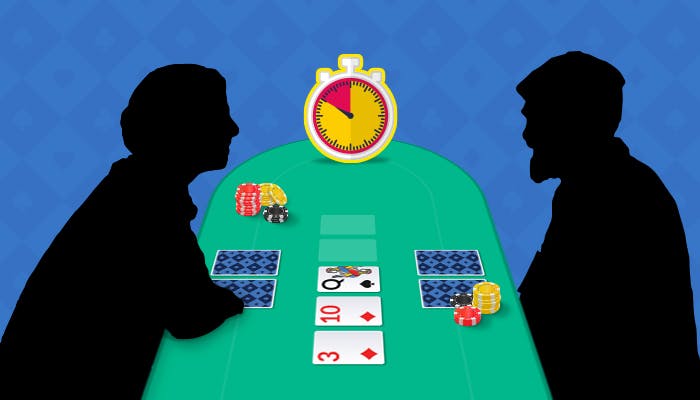
Heads-Up SnGs are one-on-one matches that reward aggression, adaptability, and psychological play. With only two players, marginal hands gain value and constant pressure is often the best approach.
- Pace: Fast, emphasising quick decisions and continuous pressure.
- Ease: Suited for players confident in reading opponents and adjusting quickly.
Recommended Strategy
General Play
- Open-raise frequently with a wide range and 3-bet regularly to seize control.
- Continuation bet often as opponents will frequently miss flops.
Adjusting to Your Opponent
- Against Tight Players: Ramp up aggression to capitalise on folds.
- Against Loose Players: Tighten up and trap with strong hands.
- Pay attention to bet sizing as a tell and adapt accordingly. See also heads-up poker and poker tells.
Hand Range Adjustments
Widen preflop ranges and embrace post-flop aggression, since heads-up dynamics make many hands playable.
Psychological Play
- Use bluffing and re-bluffing selectively and maintain mental toughness to endure long heads-up matches.
Jackpot Poker SnGs
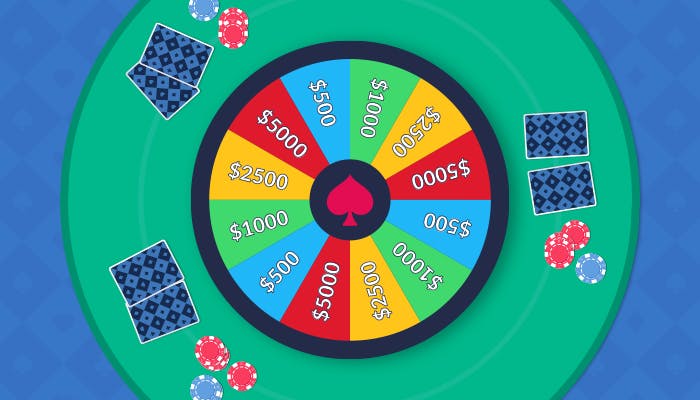
Jackpot Poker SnGs are three-player, fast-paced events where the prize pool is randomly multiplied before play starts, sometimes producing very large payouts. High variance and quick blinds make for frequent all-ins and high action.
- Pace: Extremely fast with short blind levels and frequent all-ins.
- Ease: High-risk, high-reward—best for players comfortable with variance.
Recommended Strategy
Early Stages
Play aggressively to build a stack early. Adapt your approach based on the prize pool multiplier.
Middle Stages
Switch to push-fold play as stacks shorten and focus on maximising fold equity.
Late Stages
Balance aggression with risk-reward dynamics according to the prize multiplier and remaining stacks.
Poker Freerolls
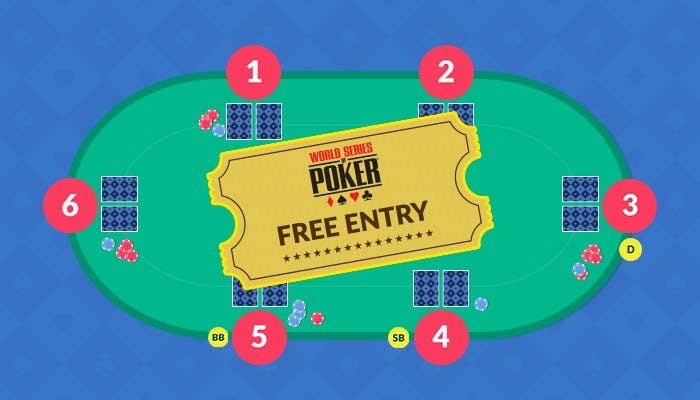
Poker Freerolls are free-to-enter tournaments where players can compete for real money or prizes without risking their bankroll. Because many entrants are beginners, early stages can be chaotic, offering excellent practice and bankroll-building opportunities.
- Pace: Moderate overall, fast and chaotic early due to inexperienced players.
- Ease: Ideal for beginners, though unpredictable play requires discipline.
Recommended Strategy
Early Stages
- Play tight and avoid getting involved in chaotic pots.
- Avoid bluffing in the early stages—value bet strong hands instead.
Middle Stages
- Open up your range and target passive players to steal blinds.
- Maintain chip preservation while selectively increasing aggression.
Late Stages
Be aggressive around the bubble and consider ICM near the final table to protect your payout chances.
Poker Tournament Satellites
Satellite tournaments offer a chance to win entry into larger, higher-stakes events (such as the WSOP) for a fraction of the cost. These events emphasise survival over chip accumulation—patience and chip preservation are essential.
- Pace: Moderate, with emphasis on surviving early stages and maintaining enough chips to qualify.
- Ease: Good for players looking to qualify for big events on a budget.
Recommended Strategy
Early Stages
- Play tight and avoid big risks—survival is the primary objective.
- Preserve chips rather than chase marginal all-ins.
Middle Stages
- Start building a competitive stack but remain cautious of unnecessary confrontations.
- Steal blinds cautiously and isolate weak opponents when appropriate.
Late Stages
- Avoid risky confrontations if you have a comfortable stack relative to the qualification threshold.
- Consider ICM and time your all-ins carefully when short-stacked near the bubble.
All Around Tournament Strategy Tips From The Experts
- Pick on the Bully: Target aggressive players, particularly those getting out of line. Use 3-betting and re-stealing to gain control.
- Use Your Big Stack: Apply pressure to smaller stacks and widen your range to dominate the table.
- Defend the Big Blind: Defend a wider range of hands, especially against late-position raises, and leverage poker positions for profitability.
- Re-steal with Small Stack: Look for re-steal opportunities against loose openers when short-stacked.
- Change Gears as Needed: Adjust strategy based on your stack size—short, mid, or big stacked.
- Laddering at the Final Table: Prioritise pay jumps, avoid unnecessary all-ins, and consider ICM when close to payout jumps.
Poker Tournaments FAQ
How Do Online Poker Tournaments Work?
In online poker tournaments, all players begin with a set amount of chips. The objective is to outlast all of your opponents. Players are eliminated once they lose all their chips. Tournaments typically follow formats like freezeouts, rebuys, or re-entries. Payouts are fixed and usually only the top 10–20% of players receive a payout. Blinds increase at regular intervals to speed play.
How Do I Enter an Online Poker Tournament?
Register via the poker lobby on your chosen site. The buy-in and fee, prize pool, number of players, and other relevant details will be displayed.
How Long Do Online Poker Tournaments Last?
Duration varies by participant numbers and structure. Standard freezeouts with 50–100 players may last 4–5 hours. Turbo tournaments conclude much faster.
Where Can I Find the Best Online Poker Tournaments?
Online poker sites offer many tournament options across formats and buy-ins. Check our recommended online poker sites for Aussie players.
What Are Satellite Poker Tournaments?
Satellites allow players to win entry into larger tournaments for a smaller buy-in. They are a common way to secure seats at major events like the Aussie Millions or WSOP Asia-Pacific without paying full entry fees.
How Much Can Be Won in Satellite Tournaments?
Winning a satellite can grant entry into events with prize pools worth millions. The satellite itself may not pay cash, but the seat you win can lead to significant potential winnings in the larger event.